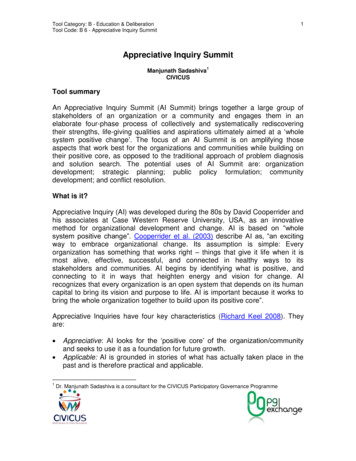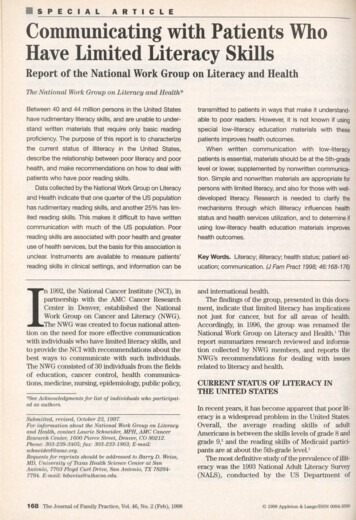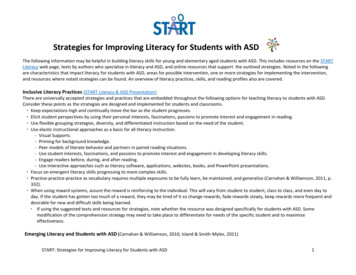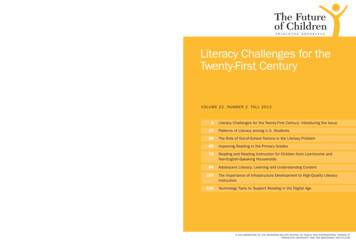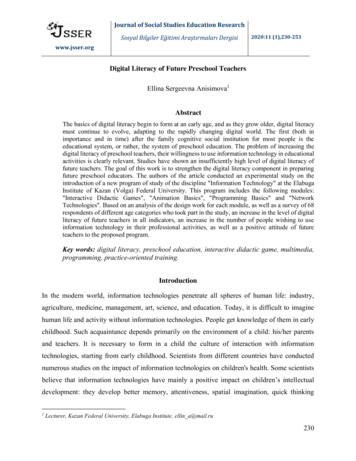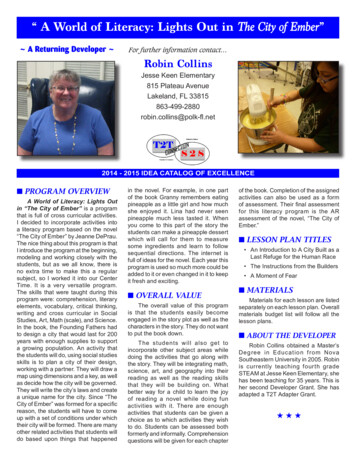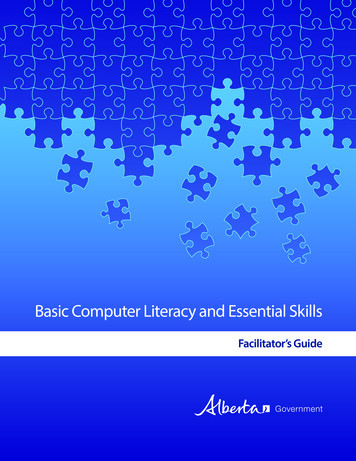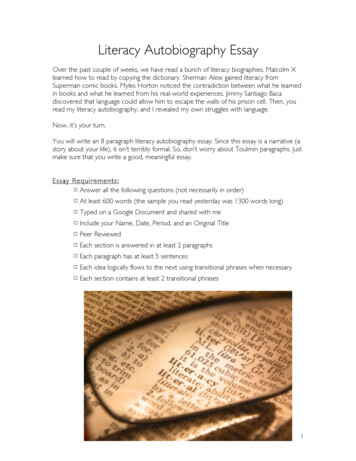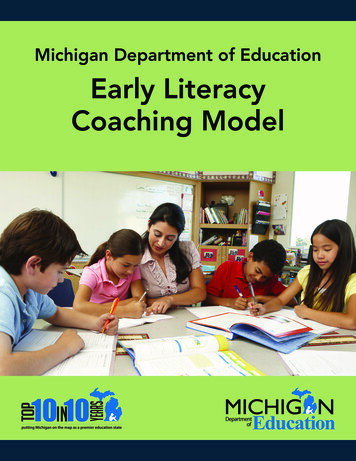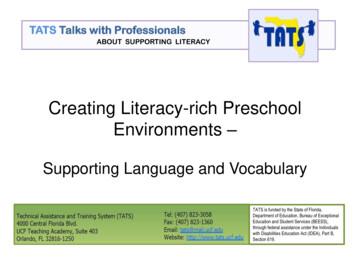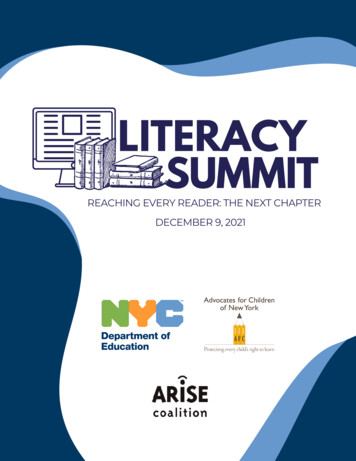
Transcription
LITERACYSUMMITREACHING EVERY READER: THE NEXT CHAPTERDECEMBER 9, 2021
CALL TO ACTIONTeaching children how to read is one of the most fundamental responsibilities of our publicschools. Reading—the ability to gain meaning from print—is the gateway to future learning,both in and out of the classroom; it is essential for full participation in civic life, democraticsociety, and the 21st century economy.Every student in New York City deserves the chance to learn to read, no matter the schoolthey attend or the neighborhood they call home. And science tells us that nearly all childrencan become skilled readers when they receive high-quality, evidence-based instruction. Weknow that children learn literacy skills best when they are explicitly and systematically taughthow to break the code that connects sounds and letters; when the curriculum reflects theirlived experiences and affirms their cultural and linguistic identities; when language andliteracy development are both understood as dynamic processes;and when their teachershave the training and support they need to be effective. Research lights the path forward,and success requires a long-term, citywide commitment to making evidence-based andculturally and linguistically relevant reading instruction a top priority.How reading is currently taught around the city differs, to some degree, by school,neighborhood, and district. The goal is for there to be a consistent use of scientifically basedand culturally and linguistically relevant curricula. If we are committed to supporting allstudents, including our marginalized students, then students with dyslexia and otherlanguage-based learning disabilities will be ensured proper instruction and intervention, andstudents who learn in two languages will benefit from literacy instruction that uses andvalues their home language.Now is the time for all New Yorkers—educators and school staff; parents and students;policymakers and philanthropists; community-based organizations, advocates, and faithleaders—to come together around a shared vision for universal literacy. Together, we will fightto ensure that every child, in every classroom, in every language, has the support they need tobecome a successful and lifelong reader.AGENDA10:00 – 10:15Welcome10:15 – 10:45Keynote Speaker11:00 – 12:00Evidence-Based & Culturally Relevant Practices:Working at the Intersection for Equity12:45 – 1:45All Means ALL:Diversifying Literacy to Meet the Needs of Every Student2:00 – 3:00How do We Move Forward?Understanding the Shared Responsibility Around Literacy3:15 – 3:30Closing Remarks
KEYNOTE SPEAKERLacey RobinsonChief Executive OfficerUnboundEDAs Chief Executive Officer of UnboundEd, LaceyRobinson sets the vision for equity-drivennational change as she carries generations ofpride and tears of her enslaved ancestors alongwith the native sons and daughters of thissacred land. While keeping an eye on thedesign, delivery, and quality of all theorganization’s antiracist work, she ensuresUnboundEd’s health, sustainability and futuredriven vision for what teaching and learning canbe in the 21st century.From the organization’s infancy, in the role of Chief of Program and Engagement, Robinsonengaged with industry partners to support standards-aligned, content-focused, equity-drivenadult professional learning and development. While supporting vital design and executionelements for UnboundEd’s signature professional learning opportunity, the industry-leadingStandards Institute, Robinson contributed to the rapid growth of an organization respectedfor its national programs and customized professional learning for K-12 educators, work thatpivoted online during the pandemic to meet the specific needs of educators.As a teacher, principal, and staff development specialist, Robinson maintained a focus onliteracy, equity, and school leadership for more than two decades. Her life’s work aims to helpeducators in school systems disrupt systemic racism and all of its legacies in classrooms.Inspired by Langston Hughes, her path is to build temples for tomorrow, strong and brave asshe knows how, and to ensure that future generations can stand free within themselves to bewhomever they choose to be. As CEO, she pursues this passion by leading an organizationknown for the highest integrity in professional development experiences; experiences whichhonor us all as professionals in educating our nation’s children, and in leading the schoolsthat serve them.
EVIDENCE-BASED & CULTURALLYRELEVANT PRACTICESWorking at the Intersection for EquityLearning to read and reading to learn are among some of the most complex tasks studentsmust perform as they progress through the grades. This activity isn’t only complex for studentsthough. Teachers must have both the requisite knowledge and skills to adeptly instructstudents to become masterful readers and writers. Social justice and equity demand that thishappens for every child. Now, seminal and current research tells us that this is best donethrough the application of evidence-based practices delivered through pedagogy that isculturally responsive. This panel will delve into what these practices are and how we can ensurethat they are taught with the cultural and linguistic diversity of our city’s students in mind.ModeratorsDr. Linda ChenChief Academic OfficerNYC Department of EducationAndrew FletcherSenior Executive Director, Early LiteracyNYC Department of EducationPanelistsLinnea EhriDistinguished ProfessorCUNY Graduate CenterSusan NeumanProfessorNew York UniversityKatie Pace MilesAssistant ProfessorBrooklyn CollegeDr. Julie WashingtonProfessorUniversity of California
ALL MEANS ALLDiversifying Literacy to Meet the Needsof Every StudentWe know there will be students who receive generally effective literacy instruction that willneed strategic support to meet reading proficiency and develop more advanced literacyskills. Whether a student has a disability, is acquiring English as a new language, haslanguage differences, or has been historically underserved, we need to ensure studentsreceive intervention and access to grade level literacy instruction across all grades. This panelwill delve into what evidence based interventions will best support students with both wordreading and language comprehension.ModeratorsDr. Esther FriedmanLiteracy Learning Specialistand ConsultantJenna ShumskyExecutive Director, Middle School Quality InitiativesNYC Department of EducationPanelistsNadine GabbAssociate ProfessorHarvard Graduate School ofEducationJan HasbrouckResearcher, EducationalConsultant, and AuthorDevin KearnsAssociate ProfessorUniversity of ConnecticutClaudia RinaldiProfessor of EducationLasell University
HOW DO WE MOVE FORWARD?Understanding the SharedResponsibility Around LiteracyAs we look ahead to the future of literacy instruction in NYC schools, all stakeholders will needto work collectively to develop shared goals to ensure we support all students achievingbeyond proficiency in their literacy development. In order to do so, how do we move forwardand develop a shared responsibility to increase literacy achievement for all students? Duringour last panel, we will learn from a variety of experts and leaders about their successes andchallenges in improving literacy outcomes We will begin to leverage this discussion toarticulate a path forward for literacy across all grades in NYC schools.ModeratorsJason BorgesExecutive Director of Literacy and AcademicIntervention ServicesNYC Department of EducationKim SweetExecutive DirectorAdvocates for Children of New YorkPanelistsJenny BogoniExecutive DirectorRead by 4th CampaignKatherine KurjakovicEnglish Language Learner SpecialistUnited Federation of TeachersKymyona BurkSenior Policy FellowExcelinEdMaggie SienaPrincipalPeck Slip SchoolMargaret GoldbergLiteracy Coach /Co-FounderThe Right to Read ProjectDr. Tracy WeedenPresident and CEONeuhaus Education Center
CLOSING REMARKSMeisha PorterChancellorNYC Department of EducationMeisha Porter is Chancellor of the New York CityDepartment of Education, the largest school system inthe nation. Appointed on March 15, 2021, she is the firstBlack woman to lead the education of the system’s 1million students in over 1,800 schools. A lifelong NewYorker and product of the City’s public schools,Chancellor Porter has climbed every rung of the DOE’sprofessional ladder over nearly 25 years: communitycoordinator, English teacher, assistant principal,principal, district superintendent, and Bronx executivesuperintendent before ascending to Chancellor.Under her leadership in her most recent position, graduation rate increases in the Bronx outpaced the gainsof other boroughs. Her vast experience in the system makes her the ideal leader to advance us toward fullyreopening our buildings to all students while accelerating progress toward equity and excellence for all.Chancellor Porter’s lifelong journey through the New York City public school system has steeped her in themyriad complexities, challenges, and opportunities across the City’s vast educational landscape. Just as herown local public education enabled her to achieve success, she is driven by the mission of enabling allstudents to realize their dreams.Born in Far Rockaway and raised in Jamaica, Queens, Porter graduated from Queens Vocational andTechnical High School before enrolling in Hunter College. She started her career as a youth organizer inHighbridge, then helped to conceptualize and launch the creation of the Bronx School for Law,Government, and Justice, the first Urban Assembly school. That was where she served 18 years ascommunity coordinator, English teacher, assistant principal, and ultimately principal.Porter then spent three years as Superintendent of Bronx District 11, which includes neighborhoods thatspan the North Bronx. In 2018, she was promoted to Bronx Executive Superintendent, leading the entireborough’s 361 schools, the New Visions Affinity schools, and 235,000 students across community schooldistricts 7 through 12.A recipient of the National Association of Negro Women’s Sojourner Truth Award, Porter has been aColumbia University Cahn fellow and an Aspen Institute fellow. She has taught at CUNY as an adjunctprofessor and participated in the Harvard University National Institute for Urban School Leaders and is amember of the Fordham University – Carnegie Foundation iLead team.Porter received her Bachelor of Arts degree in English from Hunter College, concentrating in Cross CulturalLiterature and Black and Puerto Rican Studies. She later received her Master’s Degree in Administration andSupervision from Mercy College and completed her School District Leader certification through the NYCAdvanced Leadership Institute. She is currently pursuing a doctorate in education at Fordham University.
SPEAKER BIOSJenny BogoniExecutive DirectorRead by 4th CampaignJenny is a pragmatic idealist, builder and convenor. She is a strategic leader whose work isgrounded in the belief that society’s most complex challenges can best be addressedthrough collective efforts informed and driven by those most affected by the issues at hand.Jenny has experience growing and scaling small enterprises as well as envisioning, creatingand facilitating large-scale initiatives. She has honed her leadership skills shaping and drivingcitywide collective efforts that bring together hundreds of partners representing diversestakeholders. These collective efforts – such as Read by 4th– are positively impacting thePhiladelphia community and are recognized as national models for galvanizing change.Jason BorgesExecutive Director of Literacy and Academic Intervention ServicesNYC Department of EducationJason Borges is a literacy leader and specialist. His journey began in teaching over twentyyears ago in alternative schools in Massachusetts for students with disabilities. He has servedin the Special Education Office in the NYC DOE as Senior Director of Intensive Interventionsand Director of Academic Intervention Services in the Office of Curriculum, Instruction, andProfessional Learning. Jason sees literacy as a foundation for educational justice. He iscommitted to continue serving NYC DOE schools as Executive Director of Literacy and AIS indeveloping literacy environments where all students learn skills that will help them engagewith and adapt to changing media, contexts, and to use knowledge towards a more justworld.
Kymyona BurkSenior Policy FellowExcelinEdKymyona Burk is a Senior Policy Fellow at ExcelinEd. In this role, she supports states pursuinga comprehensive approach to K-3 reading policy by assisting state leaders in building new orimproving existing K-3 reading policies, with a heavy focus on supporting successful policyimplementation.Kymyona most recently served in Mississippi as the Executive Director for the Jackson PublicSchool District’s Office of Teaching and Learning and led all aspects of the district’sinstructional programming. Prior to this, she was the State Literacy Director at the MississippiDepartment of Education where she led the implementation of Mississippi’s Literacy-BasedPromotion Act. Kymyona began her career as an elementary reading teacher and has alsotaught middle and high school English. At Jackson State University, she earned a Bachelor ofArts in Political Science, Master of Arts in Teaching English, Master of Science in EducationAdministration and Supervision and a Doctor of Education in Early Child Education.Dr. Linda ChenChief Academic OfficerNYC Department of EducationDr. Linda P. Chen is Chief Academic Officer, overseeing instructional supports for all learnersand managing the Divisions of Teaching and Learning, Special Education, and EnglishLanguage Learners. Before returning to the NYC Department of Education , Linda served asVice President for Engagement and Implementation at the Network for TeachingEntrepreneurship. Before that, Linda served as Chief Academic Officer of Baltimore CityPublic Schools, Deputy Chief Academic Officer of Boston Public Schools, and AssistantSuperintendent and Deputy Chief of Teaching and Learning in the School District ofPhiladelphia. Prior to her leadership roles in Philadelphia, Linda served as principal of PS 165 inManhattan, literacy supervisor in Queens, and an elementary school teacher at PS 163 inManhattan. She began her career teaching elementary school in Seattle.
Linnea EhriDistinguished ProfessorCUNY Graduate CenterLinnea Ehri received her Ph.D. in Educational Psychology from the University of California,Berkeley. She was a professor at the University of California, Davis, for several years beforejoining the Ph.D. Program in Educational Psychology at the Graduate Center of the CityUniversity of New York as a Distinguished Professor. She has received research awards fromthe American Educational Research Association, the National Reading Conference, theSociety for the Scientific Study of Reading, and the International Reading Association, and hasheld elective offices in the first three organizations listed. She is a member of the Reading Hallof Fame. She served on the National Reading Panel which was commissioned by the U.S.Congress to report on research-based methods of teaching reading effectively to elementarystudents. She has received federal research grants from NICHD and the Office of Education.She has published over 150 papers in professional journals and books.Her research has provided scientific evidence clarifying how words are read automatically bysight, how children develop word reading and spelling skill, and how instruction can facilitateacquisition of these processes. She has conducted studies showing that spellings of wordsare bonded to pronunciations and retained in memory when their graphemes (letters) areconnected to phonemes (smallest sounds) within pronunciations, called orthographicmapping. Storing words in memory in this way enables readers to recognize wordsautomatically as they read text. Her studies support phase theory clarifying how worddecoding, sight word reading and spelling develop in beginning readers, from prealphabetic, to partial alphabetic, to full alphabetic, to consolidated alphabetic phases. Herstudies reveal how to strengthen letter-sound learning through letter shape-soundmnemonics (e.g., shape of S drawn as snake to learn S-“s” association), and how to strengthenphonemic segmentation instruction through training in mouth positions and movements toarticulate the sequence of phonemes in words (e.g., lips closed, then open, then closed todetect /m/-/a/-/p/). Her research shows how to strengthen vocabulary learning by exposingstudents to spellings of words. Exposure activates mappings between graphemes andphonemes to enhance memory for their pronunciations. Her research shows how tostrengthen decoding instruction by teaching students to hold rather than break lettersounds as they sound out and blend them to pronounce words (e.g., ssssaaaammmm, notsssss-aaaa-mmmm). Her research supports teaching beginners to read words by breakingthem into grapheme-phoneme units rather than larger syllabic units. Her research suggeststhe importance of teaching students the major letter-sound relations, phonemicsegmentation, decoding, and spelling as part of systematic phonics instruction.
Andrew FletcherSenior Executive Director, Early LiteracyNYC Department of EducationAs a teacher, literacy coach, and educator for the past 20 years, it has been Andrew’s lifemission to ensure literacy for all. Andrew began his teaching career in San Francisco andlater taught in Los Angeles and New York. He is currently Senior Executive Director of EarlyLiteracy within the Division of Early Childhood Education (DECE) at the New York CityDepartment of Education (NYC DOE). The Early Literacy Team works to ensure equity andexcellence for all through its implementation of the Mayor’s and Chancellor’s UniversalLiteracy Initiative (ULit), which has the goal of every student being able to read on gradelevel by the conclusion of the second-grade year. The key driver of the Initiative is theschool-based Reading Coach. There are currently over 400 reading coaches supportingkindergarten to second grade teachers throughout New York City’s elementary schools.Coaches provide support to teachers and leaders through the use of cycles and theprovision of professional learning. ULit also supports the work of the larger department(NYC DOE) in collaboration with other divisions, most notably the Chief Academic Office(CAO) as well as engages in non-coaching specific projects.Dr. Esther FriedmanLiteracy Learning Specialistand ConsultantDr. Esther Klein Friedman has served New York City students since the mid-1970s as ateacher of special education and reading in elementary, middle, and high school; staffdevelopment trainer for Manhattan Region; principal in District Two; director of literacy andsocial studies in District Six; regional director of academic intervention services and localinstructional superintendent in Region Ten; director of secondary school reform, director ofacademic intervention services K-12, director of NYCLA, an NCLB Supplemental EducationalServices program internal to the New York City Department of Education at NYCDOE centraloffice; interim superintendent in District 3; and most recently as executive director of literacyand academic intervention services at NYCDOE central office. Having retired a year ago fromthe Department, Esther continues to work on several advisory and advocacy boards and hasengaged as a consultant for projects in school districts, schools, and professionaldevelopment organizations – all related to core literacy improvement and development andsupport of academic interventions in literacy. To put all of that experience to work where itcounts, Dr. Friedman has tutored children and adults with reading disabilities and challengesfor over thirty-five years.
Esther was born in Romania and lived in two other countries before arriving here in themiddle of first grade. She learned enough English to get in trouble for talking too much inclass within a few months of her arrival here. She is a product of the New York City publicschools, completed her undergraduate degree at Queens College, and received Masters andPh.D. degrees from New York University. Her doctoral work focused on reading acquisition intypically developing and struggling students. Esther’s professional interests includeexploration into the challenges of and solutions for supporting the achievement of studentsin urban schools, particularly in the area of literacy. Esther believes deeply in thetransformative power of pedagogy and hopes to convince you of it as well.Nadine GabbAssociate ProfessorHarvard Graduate School of EducationDr. Nadine Gaab received her PhD from the University of Zurich, Switzerland and receivedpostdoctoral training at Stanford University and MIT. She started her first faculty position atBoston Children’s Hospital/Harvard Medical School in 2007 and switched to her currentposition in January 2021. Currently, she is an Associate Professor at the Harvard GraduateSchool of Education. Her work focuses on typical/atypical learning trajectories from infancy toadulthood with a special emphasis on language and reading development and the role ofthe environment in shaping these trajectories. Her work is at the intersection of neuroscience,education, EdTech, and policy within a learning disability framework. Her laboratory employslongitudinal behavioral and neuroimaging studies to characterize differences in learning as acomplex outcome of cumulative risk and protective factors interacting within and acrossgenetic, neurobiological, cognitive, and environmental levels from infancy to adulthood. Hertheoretical work focuses on early multifactorial frameworks of learning differences with anemphasis on screening, early identification, and ‘preventive education’. Additionally, oneimportant key aspect of her work is the translation of our research findings to addresscontemporary challenges in educational and clinical practice and policy.She is the 2019 recipient of the LDA Award (Learning Disabilities Association America) for herwork on learning disabilities. In 2018, Nadine was presented with the Allan C. Crocker Awardfor her advocacy on behalf of children with dyslexia and reading disabilities and effortsaround the recent passage of the Massachusetts screening legislation (under the guidance ofDecoding Dyslexia MA). She has also been recognized by the International DyslexiaAssociation in her receipt of the Norman Geschwind Memorial lecture 2020 and the Alice H.Garside Award for outstanding leadership in advancing the science and advocacy of dyslexia.She is currently an Associate Editor at the journals Scientific Studies of Reading,Developmental Science, and the Journal of Learning Disabilities. She is an internationalspeaker, frequently presenting to teachers on the brain science of typical and atypical literacydevelopment as well as best screening practices for early literacy milestones, dyslexia andreading impairments. Her website with her publications can be found at www.gaablab.comand her twitter handle is @GaabLab.
Margaret GoldbergLiteracy Coach /Co-FounderThe Right to Read ProjectMargaret Goldberg is a literacy coach in a large urban district in California. She's held a varietyof roles including district Early Literacy Lead, site-based literacy coach, and readinginterventionist. In every role, she's worked to help schools and districts align instruction withreading research. She is the co-founder of The Right to Read Project, a group of teachers,researchers, and activists committed to the pursuit of equity through literacy. Her writing ispublished on The Right to Read Project blog (https://righttoreadproject.com/) and onReading Rockets d).Jan HasbrouckResearcher, Educational Consultant, and AuthorDr. Jan Hasbrouck is a researcher, educational consultant, and author. She was a readingspecialist and literacy coach for 15 years before teaching at the University of Oregon and laterbecoming a professor at Texas A&M University. She served as Executive Consultant to theWashington State Reading Initiative and as an advisor to the Texas Reading Initiative. Dr.Hasbrouck has provided educational consulting to individual schools across the United Statesas well as in Mexico, Peru, Guatemala, Honduras, Jamaica, and Germany, helping teachers,specialists, and administrators design and implement effective assessment and instructionalprograms targeted to help low-performing readers.Dr. Hasbrouck earned her B.A. and M.A. from the University of Oregon, and completed herPh.D. at Texas A&M. Her research in areas of reading fluency, reading assessment,instructional coaching, and English Learners has been published in numerous professionalbooks and journals. She is the author and coauthor of several books including “ConqueringDyslexia”, “Reading Fluency”, “Student-Focused Coaching” and “Educators as Physicians”,along with several assessment tools. Dr. Hasbrouck works with the McGraw Hill publishers asan author of their “Wonders” and “Wonder Works” reading and intervention programs. In2019 she helped found Read Washington, a 501(c3) nonprofit organization with the mission to“provide professional development opportunities, based on the science of reading, so everystudent becomes a skilled and confident reader.” She also enjoys volunteering at hergrandson’s K-8 school in Seattle.
Devin KearnsAssociate ProfessorUniversity of ConnecticutDevin M. Kearns, Ph.D. is an associate professor in the Department of Educational Psychologyat the University of Connecticut (UConn). He researches reading disabilities—includingdyslexia—in school-age children. His research focuses on linking educational practice tocognitive science and neuroscience in collaboration with colleagues at Haskins Laboratoriesand the Brain Imaging Research Center at UConn. He and his colleagues examine theneurobiological change that occurs as students learn to read. They are also developing a newreading intervention designed to link word reading and meaning and examining how theintervention affects students’ patterns of cognitive processing. He and his colleagues are alsodeveloping and testing a game-based dyslexia screening app. Devin has seven years ofclassroom experience as a teacher, literacy coach, and reading specialist. He continues to helpschools and districts implement high-quality reading instruction—including demonstratinghow to implement evidence-based reading instruction.Katherine KurjakovicEnglish Language Learner SpecialistUnited Federation of TeachersKatherine Kurjakovic is the assistant to the vice president for education and Englishlanguage learner specialist at the United Federation of Teachers in New York City. Sheprovides support in the areas of multilingual learners, curriculum, and professional learning.Prior to her current position, Katie taught English as a new language for 25 years in a K-6school in Queens, NY, and was a member of the NY State ELA Standards Review Committeefor the Next Generation Learning Standards. She serves on the Professional Standards andPractices Board for the New York State Education Department, the board of the Associationfor Education Finance and Policy, and the ELL Cadre of the American Federation of Teachers.She received her B.A. in American Studies from Barnard College and her M.A. in TeachingEnglish to Speakers of Other Languages from Hunter College.
Susan NeumanProfessorNew York UniversitySusan B. Neuman is a Professor of Teaching and Learning at New York University specializing inchildhood education and early literacy development. Previously, she has been a Professor at theUniversity of Michigan and has served as the U.S. Assistant Secretary for Elementary and SecondaryEducation. In her role as Assistant Secretary, she established the Early Reading First program, theEarly Childhood Educator Professional Development Program and was responsible for all activities inTitle I of the Elementary and Secondary Act. She has served on the IRA Board of Directors (2001-2003),and other numerous boards of non-profit organizations, and served as Co-editor of Reading ResearchQuarterly (2011-2018), ILA flagship research journal. Her research and teaching interests include earlychildhood policy, curriculum, and early reading instruction, prek-grade 3 for children who live inpoverty. Neuman has received two life-time achievement awards for research in literacydevelopment, and is a member of the Reading Hall of Fame, and a Fellow of the AmericanEducational Research Association. She has written over 100 articles, and authored and edited 11books, including the Handbook of Early Literacy Research (Volumes I, II, III) with David Dickinson,“Changing the Odds for Children at Risk” (Teachers College Press, 2009) “Educating the OtherAmerica” (Brookes, 2008) and “Multimedia and Literacy Development (Taylor & Francis, 2008). Hermost recent books are “Giving our children a fighting chance:Poverty literacy, and the developmentof information capital.” (Teachers College Press, 2012); and “All about Words:Improving vocabulary inthe age of Common Core Standards, preK-grade 2 (2014).Katie Pace MilesAssistant ProfessorBrooklyn CollegeKatharine Pace Miles, Ph.D. is an Assistant Professor in Early Childhood Education at BrooklynCollege, City University of New York. Dr. Miles’s research interests include orthographic facilitationand mapping, high frequency word learning, literacy assessment of students with special needs, andliteracy instruction for young children that is both developmentally appropriate and grounded in thescience of reading. She works closely with New York City’s Department of Education to supportliteracy initiatives that impact the city’s most under-served students. Dr. Miles proudly serves as theAcademic
Dec 09, 2021 · myriad complexities, challenges, and opportunities across the City’s vast educational landscape. Just as her. own local public education enabled her to achieve success, she is driven by the mission of enabling all. students to realize their dreams. Born in Far Rockaway and raised in Jam

